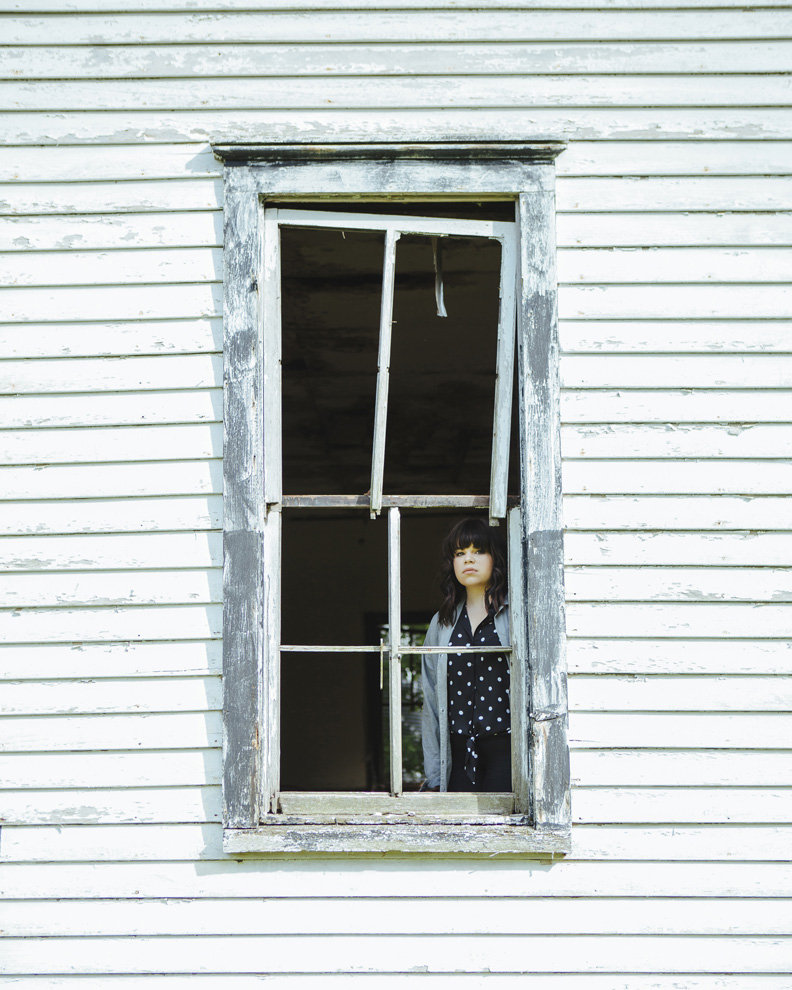Samantha Crain with Tallows and Tequila Songbirds
Thursday, July 16
Opolis | Norman
Samantha Crain with Desi & Cody
Friday, July 17
Woody Guthrie Center | Tulsa
Oklahoma’s folk scene has resumed its natural niche on the national stage, especially in the past three or so years. The big three of John Fullbright, Parker Millsap, and John Moreland have made most of the noise, but it might be easy to forget that it’s Shawnee native Samantha Crain who cracked that door open for all of them in the first place back in 2009, when her debut album, Songs in the Night, grabbed the attention of the likes of Rolling Stone and Paste.
Two more well-received LPs — 2010’s You (Understood) and 2013’s Kid Face — have followed, as have tours with the likes of The Avett Brothers, Murder By Death and, most recently, Swedish folk sensation First Aid Kit. Crain’s continued quest to quietly rock the folk world opens up a new chapter with Under Branch & Thorn & Tree, her fourth studio album set for release this Friday, July 17. Recorded again with producer John Vanderslice (Death Cab For Cutie, The Mountain Goats, Spoon) at his San Francisco-based Tiny Telephone studio, the album finds Crain reaching beyond the quaint, personal songs of her past into broader-scoped and more musically adventerous set pieces that might just represent her finest work to date. Crain — ahead of a pair of Oklahoma release shows and subsequent international touring — took the time to speak to Oxford Karma about speaking up for the stuff that matters, her brushes with producing, and being more than just a girl with a guitar.
Oxford Karma: 2015 has been a trying year in a lot of ways, socially and politically. If there’s a silver lining to it, it’s that the majority seems to be moving towards more enlightened and open-minded beliefs than the vocally persistent but dwindling contingency of more narrow, discriminatory ones. What sort of role do you think music has — or should play — in that discourse?
Samantha Crain: Music has a huge potential to be shaping, or at least starting the conversation, on a lot of these issues. We’ve had that before in the past with the ’60s New York City folk scene and with punk rock and a lot of reggae music. There’s been movements in music throughout history that have really pressed upon being a part of a political conversation and moving things towards a more socially aware attitude. It disappeared for a while, but I do feel like there are a lot of bands — even if they aren’t doing it musically — are doing and saying things on a mainstream level through interviews or social media about what they think about the political and social environment we are in. I think it’s coming back to being not weird or taboo to talk about those sorts of things. That’s a good thing.
OK: Of course, you are a woman and you are an American Indian, and you’ve definitely worked as a sort of advocate (publicly and privately) to shine a light on the problems that they respectively face, even a physical demonstration at Norman Music Festival a little over a year ago. Is that a natural role for you or is it something where you are afraid that, as a human being, you are going to say or do the wrong thing or otherwise get caught in an odd position?
Crain: It’s a very natural place for me to exist. I’ve definitely never tried to be more vocal about those things than I just organically sort of am. It can get daunting, sure. Sometimes it feels like everything you say is going out into the big, black nothingness, or that no matter how much you’ve thought about something, it feels like there is no answer. In those times, I just shrink away and be quiet and try and figure out in my head what I believe. I try not to be afraid of saying things because I don’t mind putting my foot in my mouth. If they point something out and make a good point, then I’m totally fine with standing down and acknowledging that I could be wrong and they could be right. That’s important in having these conversations, that willingness to be wrong. It doesn’t bother me to potentially look stupid; I look stupid often enough as is. I’ve always been interested in trying to figure out why the power struggle of the world is. When I was younger, it wasn’t politically driven because it was not cool to think about that stuff in that way. I’ve done as much philosophical thinking as I can on a lot of these subjects, and it seems like on a more political level is where we can move towards an answer to those questions.
OK: You kind of switched from a more strictly autobiographical approach to one that’s a little more like a fly-on-the-wall as you wrote Under Thorn & Branch & Tree. What do you think it is that led you that way?
Crain: My last three albums have been so personal that I almost emptied my well of autobiographical experiences. I needed to learn to write from other people’s perspective because I was running out of things to write about otherwise. It’s kind of back to what I used to do when I first started songwriting — turning these fictional short stories into songs. I’m not sure if I’ll keep moving in that direction or not, but that’s what I needed to do to make this album work.
OK: There’s a guard that kind of comes down at some point to allow a songwriter to speak more openly and candidly about themselves and their experiences through their music, which is obviously a threshold you went through a long time ago. So what has become your personal barometer for success in a song at this point, now that you are past the point of just allowing yourself to open up and work toward songs that speak more about the general human condition?
Crain: I like a good melody. I like something that sticks with you. Lyrics are obviously important, but the more I get involved in the music side — the producing and that sort of thing — I get more interested in melodies and the production that goes into the actual song. It’s hard to put into words, though. You just know when it’s heading where it needs to go.
OK: How big of an impact has working with John Vanderslice on these past two records had in shaping that switch in you, toward that more sound- and music-centric mindset?
Crain: He’s played a huge role. Most of the producers I’ve worked with over time, it always felt so predictable. There wasn’t much room for writing songs outside of the normal chord progressions. It was a girl with a guitar with stuff over it. Working with John, the first recording we ever did was with the bass line — it wasn’t my vocals or the acoustic guitar — and it changed how I started writing. I don’t have to have it in my hand to write anymore. Now, I might be on the piano or a snare or something else entirely. He inspired me to think about songwriting in a whole new light.
OK: You’ve stepped more into the producer role yourself, working with Kierston White on her full-length debut and most recently having your hands on the recording of Annie Oakley’s new material. What about being on that side of things have you most relished to this point?
Crain: The main reason I started doing more producing is that I’d come out of the studio with a great experience. I’ve always worked with smart, talented engineers and efficient producers, and I find that’s not often the case with a lot of the musicians I talk to. That pains me, because recording is my favorite part. I love being in the studio. I think most of it is that people who have studios or are producing don’t necessarily have a focus about where an album should go. I’ve learned so much from the great ones I’ve worked with to feel like if I could give back to these artists to make it a more positive experience, that it would be a good thing to go for. That’s the one thing that, when I listen to records at home, I’m listening for. It’s the production quality and nuances that happen that sometimes you don’t even realize until your fifth listen through. It’s like finding $5 in your coat pocket from last winter. I like that about producing, and I hope to do more of it.






